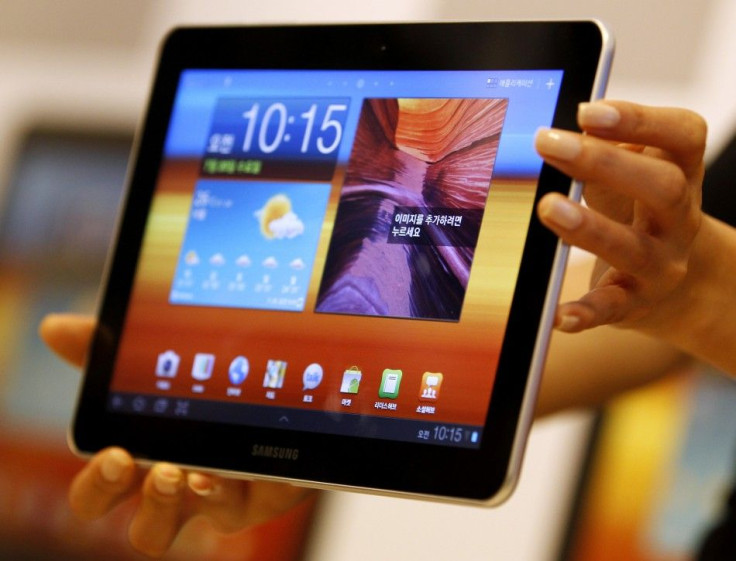Samsung Galaxy Tab: Facing Heat From Lenovo and Apple

Is Samsung Galaxy Tab tablet really as popular as the South Korean company would want us to believe? No, according to rival Lenovo, which claims that Samsung could only manage to sell 200,000 tablets in 2010 though it had shipped 1 million the same year.
Andrew Barrow, director of Lenovo's consumer products and pricing (Western Europe) has suggested to the Guardian that Samsung could be misleading the world about the popularity of its tablet.
Last year, JK Shin, head of Samsung's mobile division told reporters that consumer response to its Galaxy Tab tablet has been strong and they are confident of meeting one million sales mark.
In early January this year, Samsung increased the shipment figure to 2 million units.
The Christian Science Monitor cited the Korea Times as saying that Samsung was bullish on the sales prospects of Galaxy Tab and had already sold 600,000 units of the tablet worldwide.
However, rival Chinese tablet maker Lenovo is making an opposite claim. According to Barrow, any tablet maker who's trying to launch a product to compete with the hot-selling Apple iPad would be giving money away.
Barrow said Samsung, who had pitted its Galaxy Tab tablet against the iPad must have realized that as it could only sell 20,000 units of the tablet in 2010 despite having shipped 1 million units.
If Barrow's claim is true, then Samsung is definitely engaging in channel stuffing a strategy (claiming large shipment of products) that manufacturers adopt to boost publicity.
The mystery deepens because Samsung has been quite cagey about reporting accurate sales figure of Galaxy Tab.
However, it is unlikely that Samsung has engaged in channel stuffing as resellers would have returned unsold inventory or Samsung would have announced discounts on Galaxy Tab tablets if sales were poor - neither of which was reported by the media.
Moreover, according to the Wall Street Journal, though Samsung had acknowledged that sell-out wasn’t as fast as we expected, Samsung executive Lee Young-hee had said during a conference call with analysts that it was quite smooth.
Meanwhile, irrespective of whatever the final (and true) sale figure is, it appears Apple is taking the threat from Samsung's Galaxy Tab seriously if the legal disputes between the two companies are any indication. Apple recently managed to get an injunction to block Samsung from displaying its newly unveiled Galaxy Tab 7.7 at IFA 2011, a popular consumer-electronics show in Berlin, Germany. Galaxy Tab 7.7 offers a faster processor (1.4GHz dual-core processor) than the iPad's and boasts of a 7.7-inch 1280 x 800 OLED display, which is the highest-resolution display on a tablet so far. The tablet also packs a 5,100 mAh battery, up to 64GB of storage, microSD slot, 802.11n, Bluetooth 3.0, rear- and front-facing cameras, and GPS.
Earlier, the Cupertino-based technology giant had succeeded in stopping Samsung from launching its Galaxy Tab 10.1 in Australia and Germany after complaining that the device infringes Apple's patents and designs.
Apple has also tried to ban sales of Galaxy Tab 10.1 in the U.S. by filing a complaint that claims Samsung slavishly copies its products.
Galaxy Tab 10.1 is Samsung's best-selling tablet to date. The 10.1-inch Galaxy Tab comes with a TFT capacitive touchscreen at 149 ppi pixel density. The device comes in both 16GB and 32GB options, and runs on Android 3.0 Honeycomb OS.
The tablet is powered by a dual-core 1GHz ARM Cortex-A9 processor, ULP GeForce GPU, Tegra 2 T20 chipset, and has a primary 8-megapixel autofocus, LED flash camera with video recording at 1080p@30fps. A secondary 2-megapixel camera for video chat has also been included.
Other notable features include SNS integration, Google Search, Maps, Gmail, YouTube, Calendar, Google Talk, Picasa integration and Adobe Flash 10.1 support.
According to Strategy Analytics, Samsung had about a 16 percent share in the tablet market in the first quarter, trailing the iPad's 69 percent.
© Copyright IBTimes 2025. All rights reserved.



















